No Echo Read online
Page 19
“Unpredictable,” suggested a police trainee who had not uttered a word until now, but who had just completed a course in psychology.
“Where are you going with this, Hanne?”
Annmari Skar scrutinized her.
“This is where I’m going,” she replied, turning to the flip chart and leafing back to Severin’s aerial view of the back steps. “I’m reaching the conclusion that Brede Ziegler would never have been in this particular spot late on a Sunday night unless it was in his interests to be there. He’s a man who apparently never did anything except in his own self-interest. Those who describe him in glowing terms are people whose good opinion he has benefited from! When we consider that the man in all probability must have been in pain – maybe not too severe, but all the same … Somehow or other it must have been important for him to be in that exact spot. He must have had an appointment. He was going to meet someone.”
They all turned round abruptly as Silje Sørensen returned, breathless and carrying a bag she held out to Hanne.
“Afterwards,” Hanne said with a smile. “Sit down in the meantime.”
“Brede Ziegler could also have been threatened into going there,” Klaus Veierød said. “Isn’t that actually more likely? Somebody might have forced him to go there, either directly by holding him at knifepoint, or indirectly by having something on him. Blackmail?”
Hanne outlined a big circle around the drawing of the flight of steps, and turned round to face Klaus as she put the lid back on the felt-tip pen.
“Agreed,” she said slowly. “He could have been forced to come. Probably not with a weapon. His car was tidily parked in Sverres gate. That anyone could have threatened him first to park legitimately a good distance away from the park, then to walk all the way to the back steps, all this without anyone seeing anything, hearing anything, noticing anything … well, hardly. But of course you’re right. He may have been threatened in other ways. That he had to come, or else: the usual. Which does not alter my main point: he was going to meet someone. He had an appointment, an appointment he was extremely reluctant to break. And listen to this … Pass me my papers, please.”
She was speaking over Billy T., who was still staring at something nobody else could see, but at least he had not left the room. Klaus Veierød grabbed the thick bundle of documents and passed them along the table.
“Here,” Hanne said, withdrawing a sheet of paper. “The report of my visit to Niels Juels gate. Did you notice anything special about the bathroom, Severin?”
“The bathroom?”
Severin pondered the question as he took off his glasses.
“I … We weren’t in the bathroom. Some folk from Securitas turned up and it—”
“Anyway, I went into the bathroom,” Hanne interrupted him. “And found an unusually attractive, spacious wetroom with no notable personal effects. No medicines. Toothpaste, shaving gear. One toothbrush. I’ll come back to that. But the wall, guys – the wall above the bath tub, that was very unusual.”
It stung her when Billy T. finally looked in her direction. He tried to assume an expression of semi-interested indifference. Simultaneously he tried to obscure his eyes by knitting his brows, something that made him remind her of a disgruntled little boy.
“The wall was decorated with a beautiful mosaic. It was quite simply a miniature version of the façade on the mosque in Åkebergveien. The spitting image. I took a Polaroid photograph and have compared them. Absolutely, completely identical. As far as I can judge, anyway.”
“And what about it?”
Karl Sommarøy yawned, pinching his tiny chin between thumb and forefinger.
“Agreed,” Karianne said in a whisper; it seemed as if she had pulled herself together somewhat after her violent outburst. “What has that got to do with the inquiry?”
“Maybe nothing. Maybe it’s sheer chance that the man was murdered only fifty meters away from the original of the image on his bathroom wall. On the other hand, maybe not.”
She put her palms down on the table top as she went on: her voice was different now, more impassioned, more desperate to convince.
“Brede Ziegler was a show-off. A vain, shallow, and extremely competent show-off. If I had paid a visit to Ziegler’s apartment while he lived, I would have been blown away by that bathroom wall. I would have praised it to the skies. Someone may have done exactly that. And then he wanted to show them the original, because it …”
She had lost her hold on them. Karianne cast her eyes down, Severin had put down his glasses for good. Klaus had tossed aside his pen and was staring at the clock.
“Okay,” Hanne Wilhelmsen said, attempting to smile, but rapidly realizing that it simply turned into an unbecoming grimace. “We’ll leave it at that. But there was one more thing that struck me about that apartment. Severin, what was the most striking thing about it, from your perspective?”
“That it was stylish, of course. Impersonal, but stylish. The guy was morbidly fixated on celebrities. And not particularly fond of his wife.”
He gave a broad grin.
“At least she wasn’t allowed to leave much of a mark on the place.”
“Exactly!”
Hanne clambered up on the chair back again, and sat wagging the toes of her boots on the edge of the table.
“One toothbrush. No perfumes, no Ladyshave. One bed with no bed linen, neatly made as if in a hotel where the guests are not expected for another week. According to the notes, Vilde was informed of her husband’s death at five o’clock in the morning and then apparently stripped off the bed linen before going down to Oslo Central Station to catch the first train to Hamar.”
“You’re going to fall soon,” Silje Sørensen said. “I’m getting really nervous with you sitting like that.”
“How did you actually get hold of Vilde, Karianne?”
“First I rang her home number, but no one answered. Then I called the cellphone registered to Vilde Veierland Ziegler. She took the call, clearly half-asleep. I said that we’d like to talk to her about something serious, and that we could be in Niels Juels gate in half an hour. I had to follow procedure and find a clergyman first, so it was closer to an hour before we set off. When we arrived, she was wide-awake and had her clothes on.”
“And why had she not answered the first time you phoned?”
Karianne’s eyes wandered.
“Maybe she didn’t hear it. She was sleeping and had been out on the town. As I said. She was asleep. Tired.”
“Or maybe she quite simply wasn’t there,” Hanne said quietly. “For my part, I believe she lives somewhere else. Not in Niels Juels gate, at least. There’s not a single female in the world who leaves so little trace behind.”
Billy T. shifted in his seat. He moved his head from side to side as if he had just been roused. He scratched his chin and opened his mouth several times, as if he wanted to come out with something, but wasn’t quite sure what he wanted to say.
“It’s starting to get terribly stuffy in here,” Hanne said. “Maybe we could take a break. But before that … I’ve got something I’d like to show you. If that’s all right with you, Billy T.?”
He did not look at her, but nodded faintly.
Hanne gave a sign to Silje, who emptied the contents of the plastic bag on the table. They all leaned forward to see the items, neatly packaged in individual airtight plastic bags.
“These are the articles found at the crime scene,” Silje said. “Some are still with Forensics, for instance the cigarette butts. So I just tipped out an ashtray, myself. For illustration purposes, so to speak.”
Hanne gave a burst of laughter and swept her fingers along Silje’s arm, encouragingly. Silje smiled broadly and glanced at the others to see if they had noticed the acknowledgment.
“Kim’s Game, in a sense. What is it that’s odd here?”
“Beer cans,” Karl mumbled, fingering one of the bags. “An ice-cream paper from last summer. Cigarette butts. Condoms. A handkerchief. Use
d and disgusting.”
“The gift wrap,” Karianne said loudly. “The gift wrap doesn’t belong with all the other stuff. It doesn’t look faded, either.”
“Now we’ll take that break.”
They all turned to face Billy T.
“But we—”
“We’re stopping now. We’ve kept this going for three hours. It’s almost impossible to breathe in here.”
Karianne asked when they should reconvene the meeting.
“Tomorrow,” Billy T. said. “I’ll give you further instructions.”
With that, he left. He turned his back on them all and stomped out of the room. The others collected the papers and empty soft-drinks cans. Silje returned the crime-scene finds to the carrier bag, and Karl arranged to have lunch with Klaus and Karianne.
They had not gathered the threads. They had not allocated the assignments. They had only just begun to look more closely at all the material they had accumulated, despite everything, in the course of the previous days’ fumbling investigations. Hanne thought about the threatening letters, about Claudio Gagliostro and Sindre Sand. They had not even touched on the curious fact that Brede Ziegler was found with more than 16,000 kroner in his wallet. She thought about Hairy Mary. Only the gods knew what she was getting up to now.
Silje took her time with the carrier bag, slowly inserting one item on top of the other in a tidy system, as if packing eggs.
“We didn’t really finish,” she said. “You know, we haven’t even talked about—”
“No,” Hanne said, wrapping an elastic band around the documents before cramming them into a seventies mailbag.
“We didn’t. Not by a long chalk. But Billy T.’s the one who decides. He’s the Chief Inspector in charge.”
“It should have been you,” Silje whispered.
Hanne pretended not to hear. She had to go home to check whether her apartment was still in the same place. She should have told Billy T. about her new lodger. She had intended to do that. It just hadn’t been possible. Now it would become even more difficult.
* * *
Interview with Idun Franck
Interviewed by Chief Inspector Hanne Wilhelmsen. Transcript typed by office colleague Beate Steinsholt. There is one tape of this interview. The interview was recorded on tape on Wednesday December 15, 1999 at 15.30 hours at Oslo police headquarters.
Witness:
Franck, Idun, ID number 060545 32033
Address: Myklegårdsgate 12, 0656 Oslo
Employment: Publishing House, Mariboesgate 13, Oslo
Home phone no.: 22 68 39 80; work no.: 22 98 53 56
Informed about witness rights and responsibilities, willing to give statement.
The witness was informed that the interview would be taped, and that a transcript would later be produced. Statement as follows:
Interviewer:
That takes care of the formalities. I see you are one of the youngest people who can call themselves “war children.”
Witness:
Sorry?
Interviewer:
You were born two days before peace was declared. Your infancy can’t have conformed exactly with child-welfare recommendations. (Laughter.)
Witness:
Is this included in the interview?
Interviewer:
Everything’s included in the interview, big and small, important and unimportant. That’s the point of using the tape. So that we know afterwards what was said – not merely what the police choose to include in a report. (Pause.) Up till now I’ve managed to document that I’m trying to make light conversation with a witness. Did that disturb you?
Witness:
(Cough.) No … Apologies, it wasn’t meant like that. I was just taken aback that we started by mentioning the war. (Laughter.) When I was little, all events were designated as either “before the war” or “after the war.” The war was the great watershed. It was just bizarre that you should think like that, in 1999, I mean. But it’s not my date of birth that’s the reason for me being here, is it?
Interviewer:
No, of course not. We have not conducted any formal questioning of you as yet. You’ve only had an informal conversation with the police. A report of that conversation has been written by Chief Inspector Billy T. (Paper rustling.)
Witness:
So he does have a title, then, even though he doesn’t have a surname? Is that the report you have there? Then you’re well acquainted with the fact that I can’t actually tell you very much about Brede Ziegler. I’ve taken a principled stand about confidentiality of sources. Yes, I’m sure you’ve read my reasons for that, or do I have to repeat them now? Is that the point of this interview, that I should repeat them, formally and on the record? Then I’d like to say that I have spoken to the Senior Manager of the publishing house and he is—
Interviewer (interrupts):
No, it’s not necessary for you to repeat all that. We have a note of it here in the report. (Clears throat … violent sneeze, blows nose.) Sorry, it’s obviously the season for this sort of thing. Would you like a pastille? Where were we … ? Oh yes. It’s quite peculiar, what you’ve said about protecting a chef as a source for a cookery book. We’ve cracked a few jokes about that here at headquarters. That we’re looking forward to the secret recipes coming out in the book, I mean. But what I should say is that in this interview we’ve decided to respect your point of view, as far as confidentiality of sources is concerned. We’re not entirely sure whether you’re right about that, but the Police Prosecutor is working on it. We’ll come back to that. In this interview we’re dropping everything you’ve got to know from Brede Ziegler in your capacity as book editor. That’s something we’ll take up with the court in the fullness of time. But what I’m wondering about is whether … (Brief pause.) Tell me, have you studied law?
Witness:
What?
Interviewer:
Have you studied law?
Witness:
No, of course not. I’m an Arts graduate, and studied literature, ethnology, and English.
Interviewer:
Exactly. Ethnology. That’s research into folklore or something of that nature? (Pause.) Fascinating! Then I wonder how you know all that legal stuff. You know, everything you pointed out when Billy T. was talking to you. Criminal Procedure Act, section 125, and the European Convention on Human Rights, and suchlike. In the past few days I’ve asked all the lawyers I’ve met what they think of the Criminal Procedure Act, section 125, and they haven’t had a clue what I’m talking about. Where have you learned all that?
Witness:
Yes, erm, well … (Laughter.) Oh, I see, I understand what you’re getting at. It’s perhaps a bit odd. But I’ve got a good friend that I have dinner with now and again, he’s a lawyer and an expert on defamation proceedings and that kind of thing. He has a number of newspapers as clients. We’ve discussed it a little. That’s how you pick up bits and pieces.
Interviewer:
Impressively precise knowledge. Is it long since you learned all this?
Witness:
Long since? No … I don’t know. A while ago.
Interviewer:
Have there been many occasions when you, as a publishing editor, have refused to give information to the police about an author? With reference to the confidentiality of sources, or for that matter any other reason?
Witness:
No. (Brief pause.) Not really.
Interviewer:
Has it ever happened before that someone outside the publishing company has asked you about what an author has divulged to you?
Witness:
No, well … I’m not quite sure … Yes, at parties and that sort of thing it sometimes happens that people ask what famous writers are really like, whether they’re difficult and … that kind of thing.
Interviewer:
What’s the name of this lawyer of yours? Could I have his name?
Witness:
Well, yes
… But is it necessary? These dinners … (Clears throat, inaudible speech.) I don’t think he exactly says anything about them to his wife. Well, it’s not as if we … Don’t misunderstand, but I’d really prefer not …
Interviewer:
Yes, I appreciate that (Coughs.) … But could I have the name?
Witness:
Karl Skiold, of Skiold, Kefrat & Co.
Interviewer:
That’s fine, thanks. It’s helpful to have that on record. Then we can draw a line under that. Are you married? Divorced?
Witness:
Divorced. Years ago.
Interviewer:
Children?
Witness:
No, no children. But is this important? Can you really ask me about such things?
Interviewer:
Does it embarrass you? In principle, we can ask anything we want, you know. Then it’s up to you whether or not to give an answer.
Witness:
I’m childless. Is this important, I asked you?
Interviewer:
No, it’s not important. Just good to know. Let’s talk about Brede Ziegler.
Witness:
Yes, but I already said … The terms of this interview—
Interviewer (interrupts):
We’re still in agreement about the terms. I’d just like to know how well you knew Brede before you started work on this book?
Witness:
I didn’t know him at all. That is to say … just by reputation. Who didn’t?
Interviewer:
Had you any personal dealings with him after you started working with him?
Witness:
No, absolutely not. It was a purely professional contact in connection with my work on the book. We always worked in my office. Yes, as a matter of fact … Apart from one time. I was with the photographer when she took some photographs at Entré. Afterwards Brede and I stayed on and talked for a good while. We had something to eat, but the restaurant was closed. That was the only time we weren’t at the publishing house, as far as I can remember.
Interviewer:
Photographer, I see. What’s the name of the photographer?
Interviewer:
Suzanne Klavenæs. Wait a minute … (Rustling, pause.) Here’s her card.

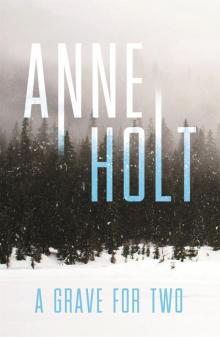 A Grave for Two
A Grave for Two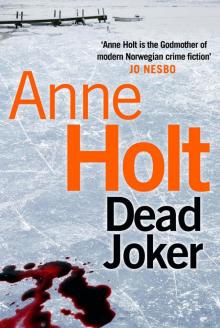 Dead Joker
Dead Joker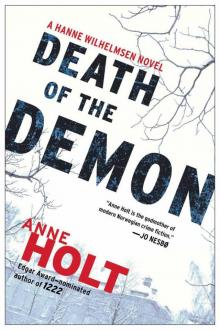 Death of the Demon: A Hanne Wilhelmsen Novel
Death of the Demon: A Hanne Wilhelmsen Novel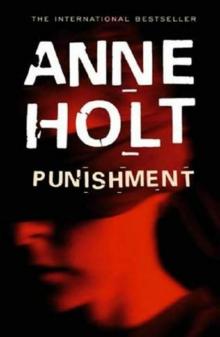 Punishment aka What Is Mine
Punishment aka What Is Mine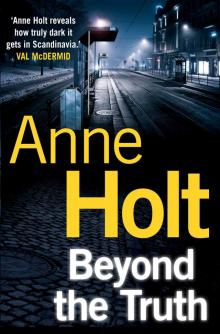 Beyond the Truth
Beyond the Truth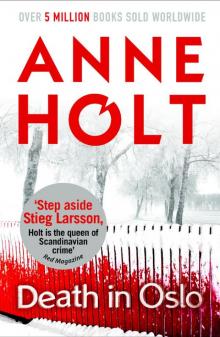 Death in Oslo
Death in Oslo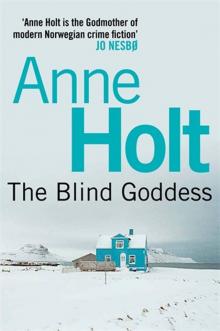 The Blind Goddess
The Blind Goddess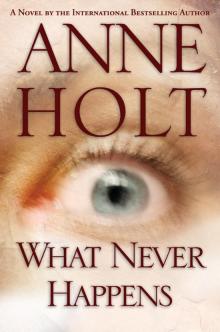 What Never Happens
What Never Happens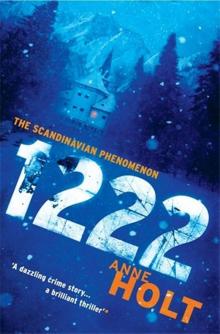 1222
1222 In Dust and Ashes
In Dust and Ashes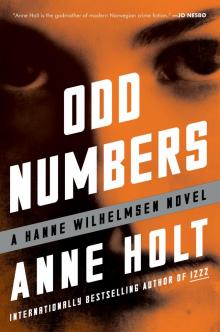 Odd Numbers
Odd Numbers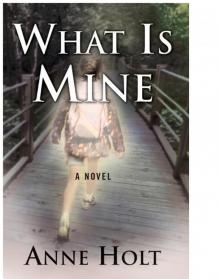 What is Mine
What is Mine What Dark Clouds Hide
What Dark Clouds Hide Blessed Are Those Who Thirst
Blessed Are Those Who Thirst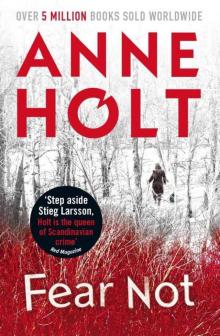 Fear Not
Fear Not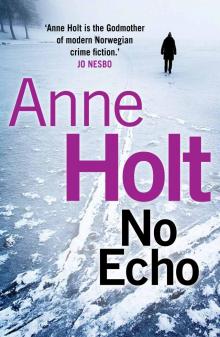 No Echo
No Echo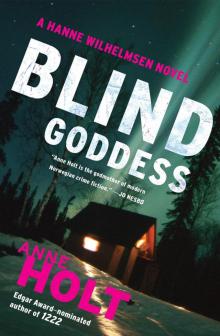 Hanne Wilhelmsen - 01 - The Blind Goddess
Hanne Wilhelmsen - 01 - The Blind Goddess